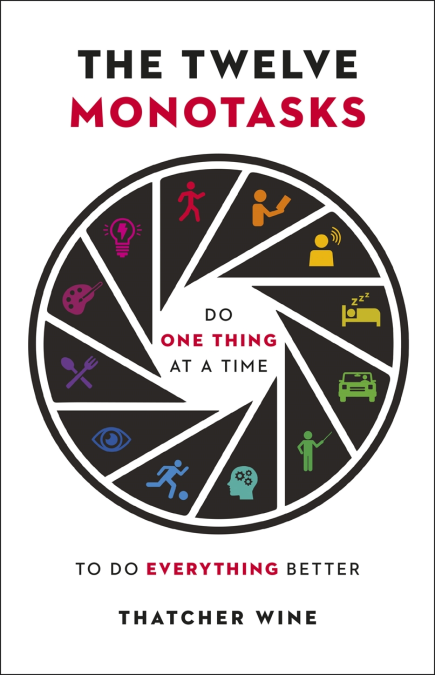Focusing on one task at a time — or monotasking — allows us to reclaim our attention and increase productivity.
“Can I interest you in everything all of the time?” asks comedian Bo Burnham in a catchy, sinister song in his 2021 Netflix special. The quip is a commentary on the constant, seemingly inescapable stimuli of modern culture — one that increasingly exists in the digital sphere. But Thatcher Wine, founder of Colorado-based specialty bookseller Juniper Books, is outmaneuvering the onslaught of daily distractions with a strategy that’s almost too simple: do one thing at a time.
 Thatcher Wine is the author of The Twelve Monotasks: Do One Thing at a Time to Do Everything Better, and the coauthor of For the Love of Books: Designing and Curating a Home Library. He is the founder and CEO of Juniper Books, a company based in Boulder, Colorado, that specializes in building custom libraries and creating unique book sets.
Thatcher Wine is the author of The Twelve Monotasks: Do One Thing at a Time to Do Everything Better, and the coauthor of For the Love of Books: Designing and Curating a Home Library. He is the founder and CEO of Juniper Books, a company based in Boulder, Colorado, that specializes in building custom libraries and creating unique book sets.
“I’m not anti-technology. I’m pro paying attention,” says Wine. “The idea that you could be fully present is kind of revolutionary in the year 2022.” Wine’s book, The Twelve Monotasks: Do One Thing at a Time to Do Everything Better, is a guide to putting our full energy into one task, or “monotasking,” as our attention becomes an increasingly valuable commodity.
“Our devices make us feel like we’re much better able to multitask than we actually are,” says Wine. But they actually fragment our attention. Evolutionarily, multitasking is meant to keep us aware of our environment and keep us safe, not allow us to simultaneously nod along on Zoom and send an email at the same time. “It might look like multitasking, but it’s really creating a mental traffic jam,” says Wine. According to a 2010 study, only two percent of people are true “supertaskers,” able to juggle two cognitive-heavy tasks simultaneously.
Read more: How Social Media Harms Our Brains
The term “multitasking” emerged in the ’60s in reference to the concurrent jobs a computer could perform. But in humans, numerous studies have shown task switching results in decreased productivity, increased mistakes, and a decrease in quality of thought. Research from the University of California, Irvine, found it takes 23 minutes and 15 seconds on average for a person to return to their original task after being interrupted.
“We’re doing more than we’ve ever tried to do in 21st-century life — we have busier schedules, technology that keeps us constantly connected, and our to-do lists keep going and don’t stop. Even if you get it all done, it often doesn’t feel good because you’re exhausted.”
Wine developed his monotasking philosophy on the heels of myriad personal challenges — from business setbacks to a divorce and a life-threatening cancer diagnosis. “I was overwhelmed with work and had a million things to do, but my nine-year-old daughter was anxious about an upcoming class trip and having trouble with her homework. I ended up reading to her, which I hadn’t done in years,” says Wine. “I gave my full attention to reading, she gave her full attention to listening, and I felt both our stress melt away.” They continued the routine the next night, with the same results, and Wine sensed he was on to something.
“We’re doing more than we’ve ever tried to do in 21st-century life — we have busier schedules, technology that keeps us constantly connected, and our to-do lists keep going and don’t stop,” says Wine. “Even if you get it all done, it often doesn’t feel good because you’re exhausted.”

Read more: How to Escape The Algorithm
Once he applied the same level of focus he had reading his daughter a book to other areas of his daily life, like a business call or a bike ride, he noticed time slowed down and life was more enjoyable. He was less worried about getting to every item on his to-do list. And the more he practiced, the easier it became. “The beauty of monotasking is you don’t need to wait until after work,” he says. “It doesn’t require taking a vacation or going to a retreat. You can do it anytime, anywhere, whatever you’re doing.”
Wine’s book outlines a range of activities that we do every day, or at least once a week — reading, walking, listening, sleeping, eating, learning, teaching, playing, seeing, creating, and thinking — and provides a roadmap for engaging in these daily activities with our full attention, strengthening our monotasking muscles along the way.
“The beauty of monotasking is you don’t need to wait until after work. It doesn’t require taking a vacation or going to a retreat. You can do it anytime, anywhere, whatever you’re doing.”
Ready to embrace monotasking? Here are a few pointers from our conversation with Thatcher Wine:
We’re often encouraged to think of free time as fillable. If you’re on a walk, you might be listening to a podcast or an audiobook, scrolling, or checking your email. Next time, leave your phone at home or keep it in your pocket during your stroll so you can focus on the task at hand.
Your phone is also a distraction in the morning. Instead of looking at it first thing in the morning, read something in print to start developing a monotasking habit.
If you need to complete a task on your to-do list, try doing another focused activity first, like taking a walk. Giving your full attention to walking will strengthen your monotasking muscles, which you can apply to the next task.
When do you feel most fully present? Maybe it’s reading or watching your kids play soccer. Notice the feeling of clarity and connection in your body and mind and the contrast that you feel when multitasking. The more we get in touch with who we are when we’re present, and we recognize how good it makes us feel, the better.

Read more: 5 Ways to Develop Healthier Online Habits
Have feedback on our story? Email [email protected] to let us know what you think!

Shop Pillows
The Essential Organic Pillow Collection
Gentle, breathable, non-toxic support.





